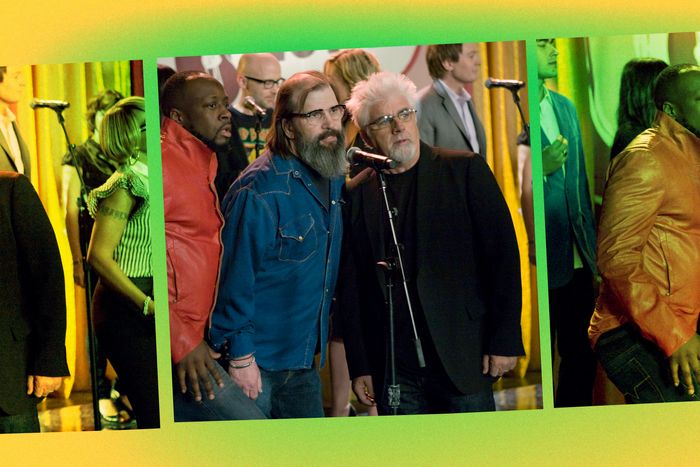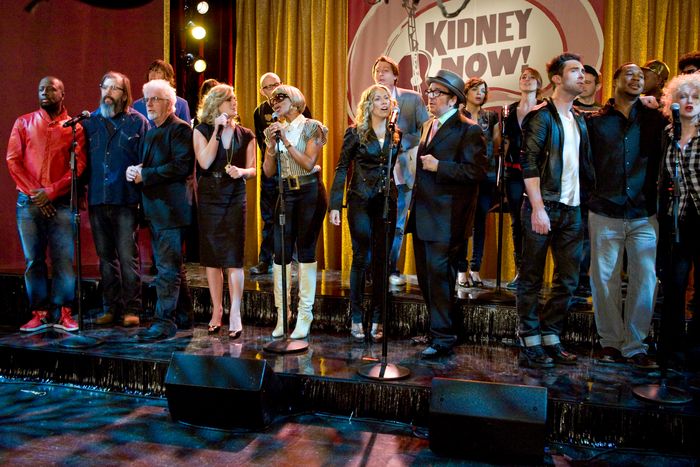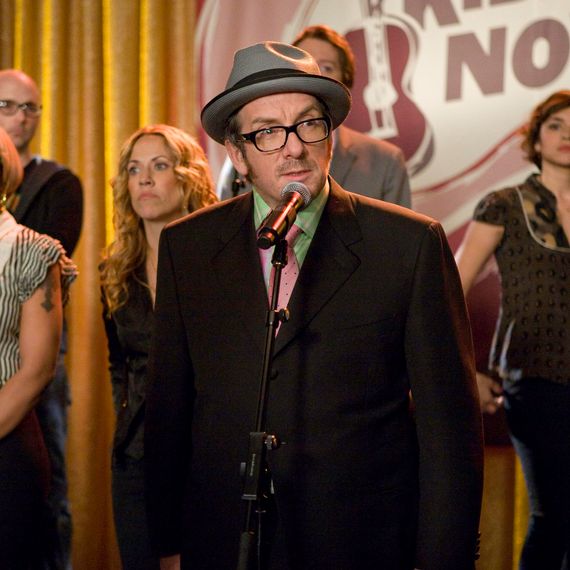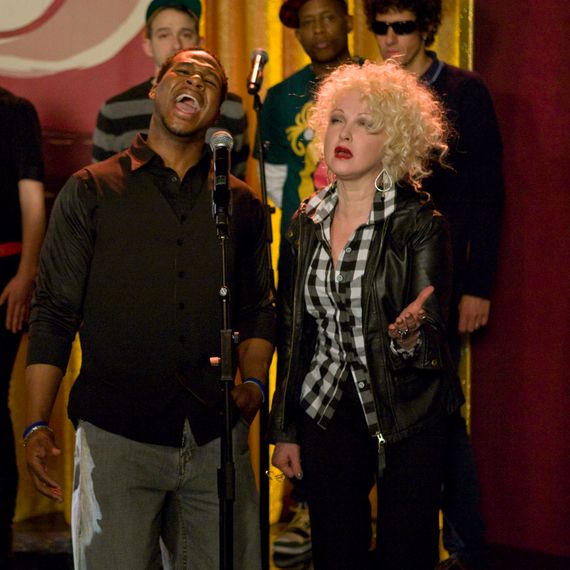
Jack Donaghy called in every favor he had for 30 Rock’s season-three finale in 2009. When you realize the stakes, how could he not? His biological father, whom he finally met after a lifetime of separation, needs a new kidney … or else. Since Jack isn’t a suitable donor himself, he concocts the next best thing: a celebrity charity concert called “Kidney Now!” to outsource the problem to a benevolent soul with an organ to spare. “It’s like ‘We Are the World,’” he rationalizes, “or ‘Weird’ Al Yankovic’s less successful parody benefit, ‘We Are the Pizza.’”
One by one, musicians agree to participate when Jack presses them. Elvis Costello doesn’t want his career as an art thief exposed, and Mary J. Blige owes Jack after he got her out of a 20-year exclusive performance contract at SeaWorld. (Unsurprisingly, Clay Aiken is roped in because he’s Kenneth Parcell’s cousin.) But the full extent of the sonic power isn’t realized until the first chord strikes on “He Needs a Kidney,” when we see Sheryl Crow, Adam Levine, Sara Bareilles, and none other than Michael McDonald crooning together on the TGS stage. “If I had to sing a song about something,” McDonald now cracks, “I guess kidneys are as good as anything.”
He was one of 18 musicians who agreed to take a chance and appear as themselves in this 30 Rock episode, in which they each got a few vignettes of “He Needs a Kidney” lyrics to play around with. (“Milton Green needs a kidney just like I need this beard,” McDonald says mid-song. “You don’t want to know what’s under here.”) While the Doobie Brother still doesn’t know why his name was thrown into the mix, in the subsequent decade he considers the experience “a real kick” that exceeded his expectations. “You brought up a great memory for me,” McDonald, whose memoir will be released next week, explained in a recent conversation. “I hadn’t thought about it in a long time, and it’s nice to know that it’s emerged as one of the best episodes from 30 Rock.”
I think it would be appropriate to start by asking how many kidneys you have.
Miraculously, I still have both.
Take me back to where you were, life- and career-wise, in early 2009. I know you had recently wrapped up a trio of Motown cover albums. Were you actively looking to broaden your creative pursuits?
Not particularly. I don’t recall how 30 Rock came about for me, but I had met Alec Baldwin about a year leading up to the episode. We played in Banff at an event and talked briefly, so the idea could have come from him. I guess the writers were brainstorming what artists would be fitting for a kidney “We Are the World” moment, and somehow I, in a weird way, fit into that vision. My acting chops aren’t that great, so I’m hoping I didn’t disappoint them too much. But it was a very funny bit. Maybe it was like, being a Doobie Brother, I could naturally be plied with any number of different drugs to say or do anything, you know?
Were you familiar with 30 Rock and its very specific type of humor prior to your appearance?
Oh yeah, I watched it quite a bit and found it terrifically funny. I loved the characters — they were so vivid and neurotic. It was all the things you love about your friends and how totally flawed they are. It was brilliant writing. I think it led the charge in some ways for network comedies that came later with very stream-of-consciousness characters who talk without thinking and step all over themselves in the process. You can’t get enough of that stuff. Seinfeld kind of started that. I remember hearing an interview with Larry David where he said, “Most of our scripts were improvised. Really, they were just based on conversations we would have at the grocery store about the produce. We tried to see, ‘How neurotic are we really?’ And those wound up being parts of the episodes we would tape for the show.” 30 Rock really touched on that, in how people go through life in an onslaught of dysfunction and somehow survive.
How were you approached and wooed with this idea? Was it a conceit you immediately understood as being funny, or did it take some convincing?
It was a tough call. Like most of these types of shows, when they tell you what they’re thinking, that’s enough to scare you away right there. But somehow, you learn that if you trust a show’s record — like where 30 Rock was at that time in its run — you figure they’re going to pull this off somehow. They’ve got something in mind that’s going to be funny, even if the initial listening to the idea is enough to scare the hell out of anyone. I don’t think you ever hear about these things and go, Oh wow, that’s great. You more or less tend to go, What? So yes, my initial reaction was, What the hell are you talking about?
But it turned out to be very funny, and it’s probably one of the better episodes. I remember my manager going, “You’ve got a chance to be on 30 Rock. That’s huge. But I got to tell you, here’s what the episode is going to be about, and it’s a very specific offer.” He didn’t know if it was worth it. Typically, I’m game for anything. I responded, “Sure, yeah, it’ll be something funny. You can almost bet on that.” It gave him pause, and it honestly gave me pause, too, but I’m more prone to say “yes” than I am to say “no.” I learned early on in this business that 90 percent of what you do, you just have to say “yes” first and go with it.
What was going through your head when you got the script and realized the scope of what you were singing? I mean, “This country has 600,000,000 kidneys, and we really only need half” hits different from “You see it all in 3-D, it’s your favorite foreign movie.”
It’s all a spoof, and the ridiculousness of the premise of the whole thing was not lost on anyone. The hardest part is keeping a straight face while you’re singing it. Something I’ve always failed at miserably when doing mockumentaries is to remember that I’m supposed to be playing it straight. You’re supposed to be delivering whatever this text is as if you really believe it’s logical and lucid. There’s some part of us that wants to give away that we know we’re joking, which totally ruins the whole thing. What makes it funny is that the person delivering a line really believes what they’re saying or is onboard with whatever is obviously ridiculous to anyone with two wits to rub together. They think it’s actually a sacrosanct truth. You’re not supposed to act like you know you’re telling a joke, and you’d be surprised how hard that is.
By my understanding, everyone had only one day to shoot this. Is that correct?
It was all shot in one chaotic day. A lot of the principal actors weren’t there. They just brought the music people in to do this scene. Basically, what we shot that day was our scene of singing this anthemic song about the kidneys — just that scene. There wasn’t much individual dialogue from any of us. There was one or two lines in the song that we all got.
You were grouped together to sing with Steve Earle and Wyclef Jean. What did you three fine gentlemen discuss when the cameras weren’t rolling?
I remember Wyclef Jean took us all down a road of why he couldn’t do the song anymore because he had a friend or family member who was also waiting for a kidney donor. He began to realize that he wasn’t going to participate in this thing because of a real-life issue that precluded him from being present. It was a very serious, heartfelt thing. It created a little bit of awkwardness. You could hear a pin drop in this room full of musicians going, “Oh my God, that’s so sad, we’re sorry, Wyclef.” And then he ended it with, “Nah, I’m just bullshitting you.” He lowered the boom on all of us with “I just wanted to see how you would all react if I said that.” So that broke the ice for everyone. We all felt better about making light of something as serious as kidney disease.
What other musicians from the group were you keen to speak with and get to know better?
It was a blast getting to talk to everyone. Sheryl Crow was there and — oh, I’m having a senior moment. “Girls Just Want to Have Fun”?
Cyndi Lauper.
She was fun, and I always enjoy meeting other musicians. Steve Earle and I were neighbors for years in Nashville, and we never met. We finally got to socialize for the first time on 30 Rock. Can you believe that? I could have thrown a rock at his house, and I just never saw him. He was always on the road, and I was too.
Was it generally an ego-free affair among all of these famous people?
Everybody knew our function was our pathetic comic value, not our musical talent.



A running joke in the song is that no one was paid for their performance except Sheryl Crow. Were you compensated for this?
I honestly don’t remember, but that’s also a great running joke with the charity events that musicians do. There’s always a sense of, We’re doing this for charity, but there’s always somebody who gets paid, and the task is to keep that a secret from everyone else. I mean, that was my experience with a charity I was once part of. I tried to be true to my word with the person I was talking to, who obviously didn’t get the memo about not getting paid so it wasn’t really their fault. But that’s a common thread in a lot of these charity events. There’s that one person who always winds up being paid, and then everybody else goes, Aww.
Earlier in the episode, Elvis Costello refuses to endorse the message that “if a song reaches just one person, you’ve done your job.” Where do you stand on this?
It’s a philosophical statement. I guess it’s true. Of course, we’ve all pursued this career hoping we’d be on Billboard charts at some point in our efforts. But I get it from both angles. It’s kind of like, I’m just doing it for the love of the common people, but we all know what we’re really trying to accomplish with success. We all grew up with aspirations to be a rock star. So we’re usually lying through our teeth.
Did you watch the episode live when it aired?
My managers taped it for me, and I watched it later because I believe I was playing a show that night.
Tell me what it was like in the aftermath of its airing. Was your phone blowing up from friends and envious peers?
I know a lot of people in my life really enjoyed it. It’s like when the Doobie Brothers appeared on What’s Happening!! back in the ’70s. To this day, people come up to me and go, “I saw you on that show when I was 11.” Or when the Doobies played on Saturday Night Live — people still bring that up to us because, again, it reminds them of a particular time in their life. I always find it interesting, the impact some of these shows have. It’s the same with 30 Rock. People will come up and make some reference to my kidneys or ask me about how my kidneys are doing, but they make those references because it made an impression on them. To this day, I get people coming up and making jokes about the kidney song.
I saw Elvis Costello’s concert residency in New York last year, where he played 250 songs across ten nights. “He Needs a Kidney” wasn’t among them, and I feel it was a missed opportunity. Have you ever been compelled to try the song out live just for fun?
I can say honestly I’ve never.
Are you reconsidering now?
Well, you’ve given me some pause and some food for thought here. I’ll have to think about that one. But up until this moment, no, I’ve never really thought about it.
This was a play on “We Are the World,” and one of the performers, Cyndi Lauper, is a bridge between both songs. Were you considered for the 1985 single? I’m curious about the timing since you had just won a Grammy for a duet with James Ingram, another “World”-er, which Quincy Jones co-wrote. You were in an orbit there.
I don’t really have an answer to that because I don’t know, myself. I thought it was a great effort on Michael Jackson and Quincy Jones’s part. Any time when music or people have the most impact on a wider audience and they take the time to put out a message of hopefulness and remind the greater humanity that we’re capable of making great changes in the lives of many people, that’s always a noble effort. So even though I wasn’t on it, I still think it was a wonderful thing they did.
I ask this fully aware of the breadth of your influence in the music industry, but did “Kidney Now!” give you any fulfillment that your past endeavors hadn’t achieved?
Like a lot of people, I’m a huge fan of Tina Fey, Alec Baldwin, and all the comic actors on that show. I’m also a big fan of the comedians from Saturday Night Live. So any time I’m asked to participate in something they’re involved with, I feel very flattered and grateful that I would even come to mind. It’s the same whenever I appear on Jimmy Fallon’s show. I’m always really appreciative of the chance to work with those people and to commune with them artistically because it’s outside the realm of what I do. I think those things do have a tendency to snowball. One thing leads to another and it works out, you know what I mean? It’s all about how if you do one thing, it might open the door to something else. That’s the mind-set I choose to embrace.
Who would be deemed worthy enough to receive one of your kidneys?
I think anyone who needs one would be worthy enough.
Are you sure you don’t want to be more specific? Your phone might be blowing up after this interview is published.
Of course, when you see why people usually give up a kidney, it would be for someone like one of my kids, my siblings, or my wife. That would be where I would start to give up a kidney. And then you would have to be compatible. But who’s worthy? That’s a big question. Personally, I would do it in a heartbeat for someone I loved in my immediate familial circle.
More From The Role Call Series
- Amy Irving Answers Every Question We Have About Crossing Delancey
- Patrick Fischler Answers Every Question We Have About Mulholland Drive
- Nicholas Guest Answers Every Question We Have About Christmas Vacation


